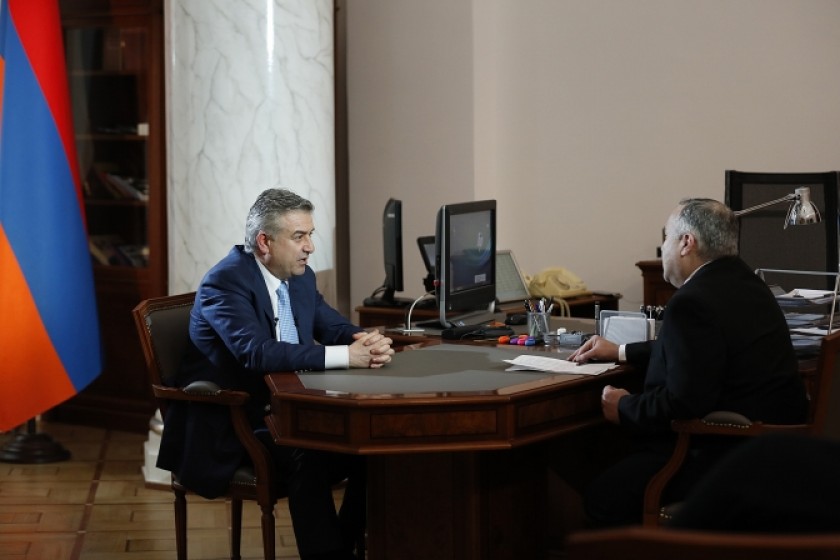
Karapetyan to Pashinyan: Come to the Parliament; Present Your Platform
Below are translated excerpts of an interview given by Armenian Acting Prime Minister Karen Karapetyan to Shant TV. (The interview was published by Karapetyan’s office)
Mr. Karapetyan, you didn’t go to the meeting today that Nikol Pashinyan had invited you to, arguing that nothing would be gained in the long-term, given that the agenda and format was presented unilaterally. What will it take for negotiations to have real merit?
We explained this in our statement, and there is no difference in comparison tour earlier clarification. I believe the logic is clear. Negotiations have long-term merit when the sides want to listen to one another, when they want to understand the position of the other. Whether or not they reach an understanding or not, whether they will be flexible negotiators or not, this in itself is a process. But, if from the start, it’s declared that this is the agenda and the other side has not right to formulate an agenda, this isn’t a negotiation. I don’t know what it is.
Negotiations haven’t happened. Instead, there was a press conference, given the presence of numerous media outlets. During the conference, Nikol Pashinyan said that Karen Karapetyan had doubts about his negotiating skills. He also said that “How can any person who is uncertain about their negotiating powers in their own country negotiate, for example on the Nagorno Karabakh matter.’ What’s your reaction?
First, I don’t know if Mr. Pashinyan, as a negotiator, has great experience or not, but I have interesting experience as a negotiator. Moreover, my negotiating experience is in different religious, objective and linguistic realms. To date, I’ve never been defeated in the negotiating process. To be an orator, to have authority, doesn’t qualify one as a good negotiator. That’s the reason for my answer.
During yesterday evening’s rally, Pashinyan said that either he would become prime minister or no one else. At another time, he said that the crisis would deepen if he doesn’t become prime minister. What’s your comment on this? Overall, how to you see solving this problem, regardless of who becomes prime minister?
I deeply respect those citizens who are expressing their mistrust, their disagreement and complaints, and for the fact that everything is happening peacefully. I hope and pray to God that things continue this way.
We must mold a political culture in which we listen to one another. Now, our citizens have gathered somewhere and are saying ‘this is the prime minister’. If citizens somewhere else are saying ‘that is the prime minister’, how will we select which one is the prime minister? For this reason, there’s a forum where the prime minister presents his program. I believe that Mr. Pashinyan has his program as to what kind of country he wants to build, what are his security targets, his foreign policy, views on economic growth, social projects, justice, etc. But we must select a program. We are not electing an individual, one who is moral, a good person, with a strong presence. We are choosing thoughts, ideas.
I don’t rule out the possibility that all our fellow citizens, displeased with current policies, might want him as prime minister. Then again, it’s possible that all of them do not. They may be dissatisfied with the current government, but if you give them the opportunity to choose whom they want as prime minister, which team and what platform, it might not be Mr. Pashinyan. Thus, we say that the constitution deals with all of this.
Come to the National Assembly with your platform and, if you have the votes, become the prime minister. To monopolize things, saying I’m the only prime minister, there are no other candidates, to say I set the agenda at the negotiating table and you have no right to do so…Well, I don’t believe this is the society we want to create.
 Videos
Videos Photos
Photos
Comments (1)
Write a comment